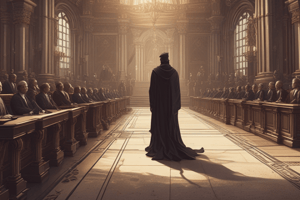Podcast
Questions and Answers
The Bill of Rights is a declaration of a person's obligations to the government.
The Bill of Rights is a declaration of a person's obligations to the government.
False (B)
Natural Rights are conferred and protected by the Constitution.
Natural Rights are conferred and protected by the Constitution.
False (B)
Political Rights enable citizens to access basic necessities like education and healthcare.
Political Rights enable citizens to access basic necessities like education and healthcare.
False (B)
The Bill of Rights is a limitation on the power of individual citizens.
The Bill of Rights is a limitation on the power of individual citizens.
Statutory Rights can be abolished by the law-making body.
Statutory Rights can be abolished by the law-making body.
Civil Rights ensure equal treatment and protection under the law based on characteristics such as income and occupation.
Civil Rights ensure equal treatment and protection under the law based on characteristics such as income and occupation.
Constitutional Rights are possessed by every citizen without being granted by the State.
Constitutional Rights are possessed by every citizen without being granted by the State.
The primary purpose of the Bill of Rights is to enumerate the powers of the government.
The primary purpose of the Bill of Rights is to enumerate the powers of the government.
Social and Economic Rights enable citizens to participate in political processes.
Social and Economic Rights enable citizens to participate in political processes.
The Bill of Rights is a charter of liberties for the individual.
The Bill of Rights is a charter of liberties for the individual.
Flashcards are hidden until you start studying




